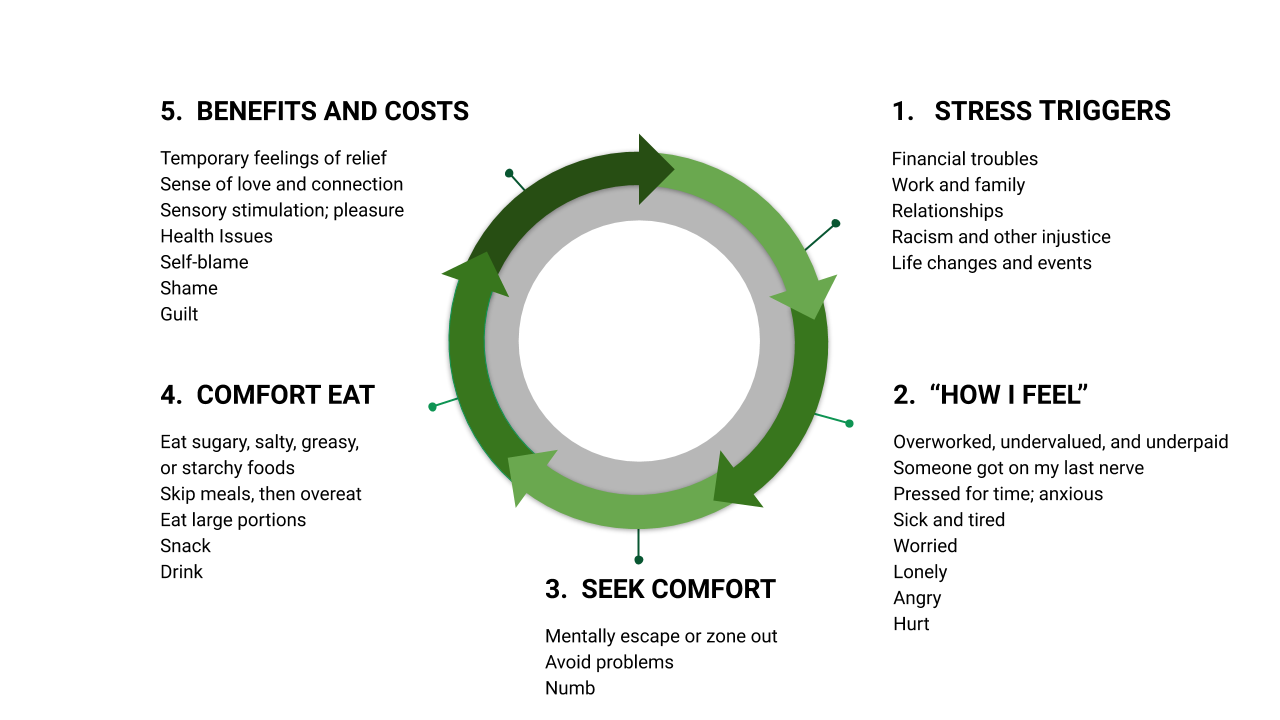Stress, Black Women's Health, and Mindful Eating
Are the stressors of life making you sick and tired? Do you find yourself turning to food for comfort? Before you take another bite, we invite you to practice mindful eating.
In 2018 my mother underwent heart surgery after years of struggling with high blood pressure. As I cared for her during recovery, I thought about my own health, other family members, and friends. I also thought of the millions of Black women who are affected by this disease.
According to the American Heart Association, 1-IN-2 Black women ages 20 years and older have some form of cardiovascular or heart disease. A key risk factor of heart disease is diet. Another factor associated with heart disease is chronic or long-term stress.
Both diet and stress are connected. For example, comfort eating is a coping strategy used by many, including myself, to deal with stress. One of the goals of Food at the Center is to help provide tools and resources like mindfulness to Black women and their loved ones to prevent heart disease, high blood pressure, and diabetes.
What is Mindfulness?
Mindfulness is a practice that involves the habit of developing curiosity or intentional awareness about the present moment in ways that can help to reduce stress and increase self-compassion. In times of great uncertainty, stress, and injustice, daily mindfulness practices can be a beneficial part of your daily self-care routine. Common mindfulness practices include mindful breathing, loving kindness meditation, mindful movement, such as yoga and walking, and mindful eating.
Practice Mindful Eating
One of the basic principles of mindfulness is observing one's thoughts, feelings, and experiences related to food and stress. For example, what thoughts and feelings come up for you after a stressful experience at work or at home? How do those experiences, thoughts, and emotions affect your relationship with food and the types of food you eat?
Below is an example of a tool that is used by nutrition and mindful eating practitioners to help guide students to increase their awareness of stress and eating habits. Some refer to it as the emotional eating cycle. In their book, The Mindful Diet, Ruth Wolever, Beth Reardon, and Tania Hanna describe a version of this tool as the Stress and Eating Cycle. The idea that stress and eating is an interconnected cycle helped me to think about my own experience and that of many Black women I know.
Take a minute or two to review the diagram. Do your best to go through the steps with gentle curiosity and self-compassion.
Stress and Comfort Eating Cycle
Self-Compassion and Mindful Eating
The goal of mindful eating is to become curious about your eating habits in a way that is gentle and compassionate, especially towards yourself. Reviewing the stress and comfort eating cycle may be enlightening. However, it can also bring up thoughts and feelings that are uncomfortable or negative. An attitude of self-compassion can help you with any possible feelings of shame or guilt.
Mindfully Consider Inequality
Many of the sources of stress and comfort eating are not self-inflicted. Rather, for many Black women, stress and comfort eating are rooted in continued race, economic, gender, and other forms of inequality at work, home, school, and the larger society. Some examples of this include: the continued legacy of unequal pay, racism in the criminal justice and welfare systems, the demands of caretaking roles, and the effects of COVID-19.
Black women are also more likely to live in neighborhoods with foods that are less healthy. These include corner stores and restaurants that serve foods high in salt, sugar, fat and starch which can be especially comforting in the moments of heightened stress. Many Black neighborhoods also have fewer supermarkets making healthy foods less accessible.
All these inequalities and more can trigger stress responses which can lead to comfort eating. Being aware of the patterns in the stress and comfort eating cycle is a first step to begin to interrupt this pattern.


Michelle is the founder of Food at the Center. She is a medical sociologist and former college professor who was inspired by her mother’s determination to take charge of her health and life through food. Michelle used the framework of mindfulness to teach undergraduates at the University of Maryland. She has also used mindfulness to develop programs to improve the health and well-being of Black or African American women and their loved ones. Michelle was born in Jamaica and currently resides in Columbia, Maryland.